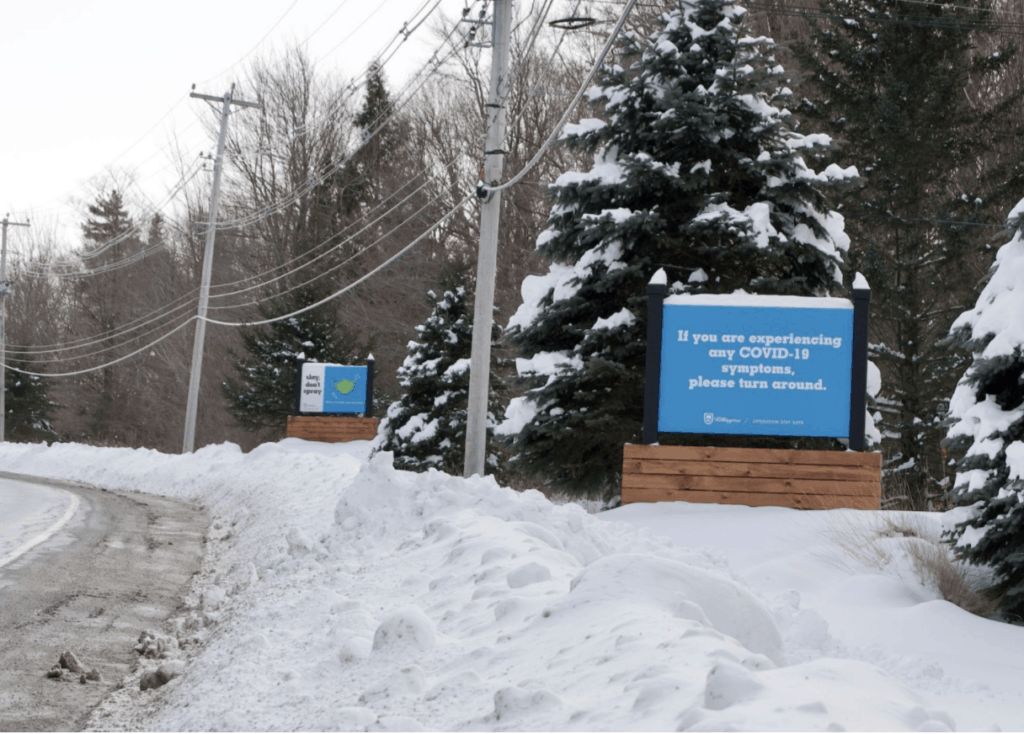
Ski resorts attract crowds, but protocols appear to be working
By Emma Cotton/VTDigger
On the snowy ascent to Killington Resort, blue road signs instruct out-of-state skiers to turn away if they haven’t quarantined according to Vermont’s Covid-19 guidelines.
The signs are a final plea by the resort, and the state, for those who haven’t followed the guidelines to stay away. Through a “Know Before You Go” campaign, the state’s marketing department has tried to tell out-of-staters they must quarantine for 14 days, or seven days followed by a negative Covid-19 test, before entering Vermont — even if just to ski for the day.
“We don’t have a large marketing budget,” said Lindsay Kurrle, secretary of the Vermont Agency of Commerce & Community Development. “This was significant, over $1 million, spent to try to educate people on how to safely travel to our state.”
Despite these precautions, some locals have expressed concern about activity at resorts.
On social media, photos have circulated widely of crowded lift lines, along with stories of parking lots packed with non-Vermont license plates. Kurrle said those photos were the subject of several official complaints to the state.
Officials, including Gov. Phil Scott, also warn against making assumptions based on license plates, as many out-of-staters have followed the guidelines, or have temporarily relocated to Vermont to work remotely or, for some, specifically to ski.
Molly Mahar, president of the Vermont Ski Areas Association, said she worries that comments from locals could dissuade visitors from coming to the state in the future.
“They may have quarantined, they may be living here for the season, or they may have moved here and just haven’t changed their car registration yet,” she said. “I really worry about the rhetoric around out-of-state people, because our economy depends on those people.”
‘I want them to play by the rules’
While expressing the need for safety, many locals have celebrated the arrival of snow and broader opening of resorts after months of cabin fever attributed to the virus.
On social media and in interviews with VTDigger, many have cited instances where resort employees have encouraged mask wearing, and others said they felt generally comfortable with measures taken by resorts.
“I think the resorts are doing what they need to do,” said Todd Wright, who often skis with his family at Sugarbush, and is also the director of Adventure Sports at St. Michael’s College. “I think a lot of it falls down on the users. The people that do this stuff have a lot of responsibility, and we just can’t shift it all and say, ‘It’s the resort’s job to manage my behaviors.’ I need to manage my own behaviors.”
Still, he was unnerved by sudden increases in drivers from out of state.
“I want them to play by the rules,” he said. “As a parent, it’s really important for my kid to go back to in-person learning. Working at the college, I just look at how much work time and effort we’ve spent into managing Covid on campus. We’ve invested all this energy, and all it takes is someone not following the rules, and then it spreads like wildfire.”
He’s seen posts from travelers who say they’ll arrive, ski and leave, but he worries about those who stop for gas, go into stores for food, or interact with customer service at the resorts.
“You’re plugging into those communities just for a second, but that contact can be catastrophic,” he said. “I think that’s what all of us in Vermont struggle with.”
A survival year
Ski areas’ roles in enforcing Covid-19 restrictions changed in early November, when cases surged and Gov. Scott reinstated strict quarantine guidelines on travelers from other states.
Hotels reported a flood of cancellations, and multiple ski resorts refunded more than $1 million in season pass sales to those who couldn’t swing the requirements for out-of-state travel.
“We know that the hospitality industry has been particularly hard hit,” Kurrle said, “and they have this additional burden, the ski areas, of this frontline enforcement, letting visitors know what our expectation is, and trying to do it ahead of time.”
Kurrle said the industry revenue will likely decrease 40% to 70% this season, a significant hit to the state’s economy. In an average year, the sport brings around 4 million skiers and riders to Vermont.
Mahar, of the ski areas association, estimates that in a typical season, skiers spend $925 million in Vermont, and two-thirds of that is spent in communities surrounding resorts. “It means a lot to the state,” she said.
The organization estimates $125 million in tax receipts from sales tax and rooms and meals tax during an average ski season. The industry is an economic driver in rural areas, and employs about 13,000 people at the height of a typical winter season.
“We knew it’d be tough,” said Mike Solimano, president and general manager at Killington. “The ski resort business is very expensive to operate, and very capital-intensive. So most of us can’t survive with a 50% reduction in revenue. This is a survival year, to be totally honest.”
He said reservations were down 40% to 50% for the Christmas/New Years holiday week.
In a phone interview Tuesday, Bonnie MacPherson, communications manager at Okemo, sighed. She had been thrilled last week about the 40-plus inches of snow on the mountain — a boon for the ski area, which has had to deal with warm temperatures in addition to the confines of the pandemic year.
Since then, the resort’s social media page, which she manages, has had an onslaught of commenters concerned about social distancing and overcrowding at the resort.
“I think they’re just scared, they’re frustrated, they’re fearful about this pandemic,” she said. “There are rumors that we’ve never dealt with before, and there’s just so much misinformation about what’s happening and what’s going on.”
MacPherson listed the precautions the resort is taking, similar to other resorts: reduced capacity, mandatory face masks and social distancing, ghost lanes between skiers in lift lines, required reservations, spaced-out chairlifts, reduced capacity indoors.
Employees enforce social distancing at Okemo, MacPherson said, but many skiers are funneled into designated lift lines because the resort can’t yet open all of its terrain. Opening a trail requires snowmaking efforts and approval from Ski Patrol.
Enforcement within the honor system
So far, no cases of Covid-19 have been traced back to ski resorts in Vermont.
Still, some locals have argued for stricter enforcement within what is one of the state’s only industries that brings thousands of travelers to gather in one place during the pandemic.
Based on state guidelines, resorts require signatures from travelers, promising that they’ve adhered to the rules, but some locals have reacted squeamishly at the thought of handling community safety through an honor system.
“I’m not going to say that nobody’s breaking the quarantine,” said Solimano at Killington. “I’m not naive … and I think the governor’s not either. I think the key for us is we need to do all the things we can control.”
Solimano said he’s made an appearance in lift lines, and has offered pass refunds to people who need extra encouragement to properly wear their face coverings. “All of them have decided that they will pull their mask up,” he said.
Skiers aren’t required to wear masks while skiing, so most of the time, he said, he assumes those without masks have forgotten to pull them back up when they reach the lift line. He’s more concerned about indoor spaces, where skiers are removing masks to eat. Lodges are reduced to 50% capacity or a maximum of 75 people, and Solimano said guidelines are enforced resort-wide.
“It’s with the threat of taking away your $1,000 pass,” he said. “I think we’re pushing harder than probably a lot of businesses. If you just walk into a retail store, nobody’s questioning where you came from.”
Resorts can revoke skiers’ passes if they aren’t adhering to mask wearing, social distancing, or if the resort learns a skier hasn’t quarantined.
“If we find somebody hasn’t done that [quarantine], we’ve already told people that we will pull their pass and probably give their name to the state,” Solimano said. “It’s the same thing if people are on site and refuse to wear a mask. We have a no tolerance policy for either of those.”
‘The benefit of the doubt’
Neither Killington Ski Area nor Okemo Mountain Resort has revoked any season passes yet, though MacPherson said the resort’s hotels have turned travelers away upon learning they hadn’t quarantined. Mahar said she had not heard of any resort in the state pulling a season pass because of violating guidelines.
Ski areas are responsible for following the state’s guidelines, but there’s no specific procedure in place for a ski resort that does not take away someone’s pass if they haven’t followed the guidelines.
“The way we manage other businesses in the state is we’ve given people the benefit of the doubt that they’re going to follow our guidelines,” Kurrle said. “If we knew that somebody was in violation, our first approach would be to provide more education and more opportunity for them to adjust their operations to improve health and safety.”
Solimano said there is little the resort can do about travelers who promise they’ve quarantined, but haven’t. He’s hopeful that outdoor recreation businesses can continue to flourish during the pandemic. A summer season busy with out-of-state mountain bikers didn’t cause any problems, he said.
“To me, this says it’s working, that it’s safe to be outdoors,” he said. “We’re trying to balance this. We don’t want to have it be a police state. We’re trying to let people enjoy the outdoors, but you know, we have to balance that and try to stay open.”




